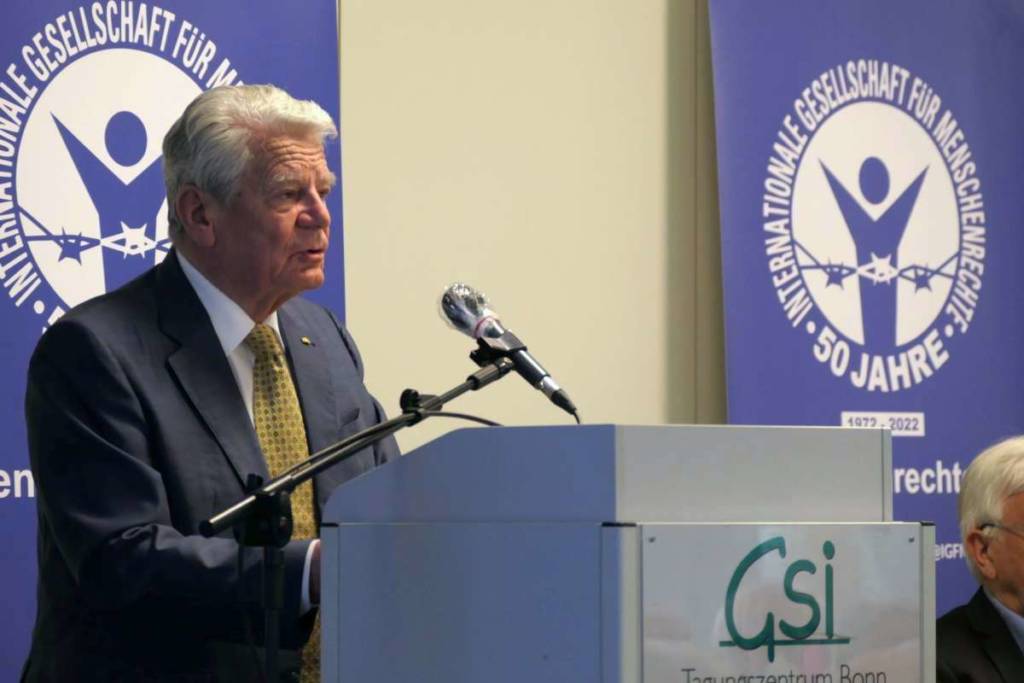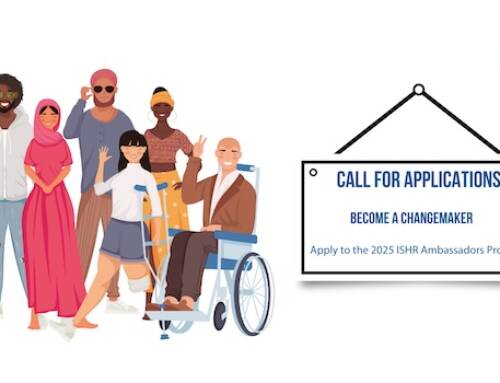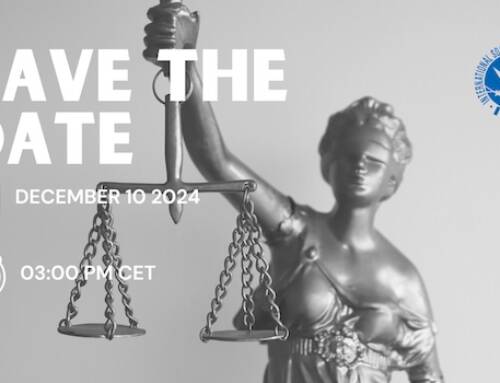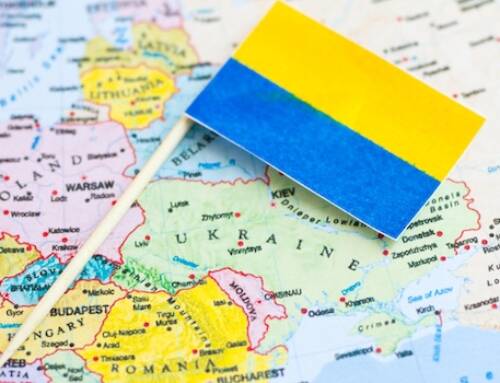
EDITORIAL
Dear ISHR Community,
It’s almost 2 months since we marked 40 years of ISHR and 50 years of IGFM (German section). The anniversary was a day of many meaningful and moving words. Words about how ISHR became what it is today. And – more importantly – words about how ISHR has made its impact in many places around the world over the decades – always with a focus on defending human rights and empowering human rights defenders.
 The anniversary took place against the backdrop of the ongoing Russian war against Ukraine. During his speech, retired president of Germany, Joachim Gauck, posed a fundamental question.
The anniversary took place against the backdrop of the ongoing Russian war against Ukraine. During his speech, retired president of Germany, Joachim Gauck, posed a fundamental question.
“Are we (the citizen as much as the politician) providing enough support to courageous Ukrainians? What can we do to stand by them? Is it responsible to continue importing gas and oil from Russia? How do we stand before those who lose their lives if we continue to pay murderers?”
Unflinching questions like these have always been asked by the ISHR. Heads of state and Heads of government of the states importing oil from Russia have to face these questions. Initial answers have already been found at the G7 summit at Schloss Elmau this week.
As ISHR, we are doing our part to stand by brave Ukrainians – as we have always done. However, I am overwhelmed and grateful for the enormous level of financial support that has been mobilized in our ISHR network for the Ukrainian section and for sections in neighboring countries through approved project proposals and generous private donations. Not only in Ukraine itself, but also in Lithuania, Belarus, and Moldova we were able to initiate thoughtful and well-fitting support projects with these funds. We present some of the stories in this newsletter.
I would like to particularly emphasize that the German Section with our IGFM partners in the war zone, under the leadership of Anton Alekseyev have been commissioned with a large humanitarian aid project by the UN, which will enable us to provide food, water, hygiene items and medicines to tens of thousands of people in need in the war zone. We will continue to report on this regularly on our website.
While the situation in Ukraine and neighboring countries continues to keep us on our toes, we also continue to be active in other regions and issues. I am particularly pleased that our efforts to strengthen existing African ISHR sections and build new sections on the African continent are slowly but surely bearing fruit. In an impressive speech during the ISHR 40th anniversary, Wanjeri Nderu, one of our newcomers to the circle of ISHR human rights defenders, told us about the character and motivation of her human rights work in Kenya. This summer, for the first time, we are able to financially support one of her projects in the field of fighting against systematic sexual abuse of school boys in Kenya.
Furthermore, by the time you read this newsletter, I will be participating as a speaker at the International Ministerial Conference on Freedom of Religion or Belief, which is held in London on July 5–6, 2022. The issue of religious freedom has been an important part of our work for many years, and it is good that this important conference is finally back as a face-to-face event after three years.
Stay active in advocating for human rights worldwide and stay connected with us doing so.
With warmest regards,
Yours,
Prof. Dr. Thomas Schirrmacher
President of the International Council of the ISHR
Ulrich Nitschke, Elena Lunz and Joan Okitoi
Managing Editors, ISHR Secretariat
HUMAN RIGHTS WORLDWIDE
Sviatlana Tsikhanouskaya : Greetings at IGFM’s 50th anniversary

“Two years ago I was a housewife,” said Sviatlana Tsikhanouskaya today’s leader and voice of democratic Belarus in her greetings to the 50th annual general meeting of the German section of the International Society for Human Rights. Sviatlana recounts the role ISHR has played in supporting and encouraging activists like herself to stay the course in the struggle against authoritarian regimes.
Thomas Schirrmacher visited the grave of Elisabeth Schiemann
 In preparation to his visit to Yad Vashem in Jerusalem mid 2022, Thomas Schirrmacher visited the grave of one of the “Righteous among the Nations”, an honor given by Yad Vashem for non-Jews who saved the life of Jews during the Holocaust. Elisabeth Schiemann (1881–1972) was honored with this precious title in 2014.
In preparation to his visit to Yad Vashem in Jerusalem mid 2022, Thomas Schirrmacher visited the grave of one of the “Righteous among the Nations”, an honor given by Yad Vashem for non-Jews who saved the life of Jews during the Holocaust. Elisabeth Schiemann (1881–1972) was honored with this precious title in 2014.
Schiemann was born in Viljandi, Estonia, but lived in Berlin since 1887. She was one of the first women in Germany to study, do a doctorate and become a professor in Germany. With her doctorate of 1912 she lectured on seed science and reproductive biology with her actual field of research being the history of cultivated plants. From 1931 to 1943 Schiemann worked at the Berlin-Dahlem Botanical Institute. Her book ‘Entstehung der Kulturpflanzen’ (‘Origin of cultivated plants’) was published in 1932, becoming a reference work in the field of cultivated plants and brought her international recognition and fame.What does Schiemann’s story have to do with human rights? Read on to find out.
Speech by Joachim Gauck, former president of the Federal Republic of Germany at 50 year’s celebration of IGFM/40 years of ISHR

Former Federal President Joachim Gauck gives the keynote speech on the occasion of 50 years of IGFM on April 9, 2022.
“I was eight years old when the Universal Declaration of Human Rights was adopted by the United Nations. And I was 11 years old when I experienced state repression in the GDR. My father was abducted for no reason at all by the Soviet secret police in 1951 and sentenced, along with other innocent people, to 25 years of forced labour in Siberia in a secret trial. I learned what it means when a loved one disappears from the family and – after years of uncertainty – finally returns, badly scarred in body and soul. My family was lucky. For thousands and thousands throughout Central Eastern Europe did not survive the communist system of injustice. Anyone who has ever felt such powerlessness never wants to allow it to happen again, not in their own family and nowhere else. The most successful advocate for human rights is within us – it is a deep inner knowledge of the dignity and rights of every human being. But obviously it sometimes takes the most atrocious transgressions to give this knowledge political validity.”
UNDP supports the launch of the virtual centre for assistance to Ukrainian refugees

How do you get temporary asylum in EU countries or financial assistance? How do you start a business abroad or relocate a business within or outside the country? Ukrainian refugees or internally displaced persons can get answers to these and other urgent questions at the virtual centre “Dia.Biznes”.
The project is supported by the United Nations Development Programme (UNDP). In its first ten days of operation, the centre provided more than 1,200 consultations. Funding for the project was provided by Sweden.
Speech by Edgar Lamm on IGFM at 50 celebrations

The history of ISHR is intertwined with that of it’s German section also known as IGFM. During the anniversary celebrations of both organizations, Edgar Lamm, the current chief of IGFM, provided an insightful account of the organizations.
From the Sections
ISHR lawyers in Ukraine: “our mission is now to help”

ISHR’s section in Ukraine is made up of lawyers turned humanitarian workers. Led by Anton Alexeyev, the team of 12 are currently providing much needed support in 13 out of the 25 regions of Ukraine.
“The situation changed from day to day. We focus on food, hygiene and medicine, but people are also asking for fuel, money and most importantly drinking water. There is an urgent need for medicines for the heart, high blood pressure, bandages and especially baby food.”
Thank you video from Putivl, Ukraine

In May 2022, the Information and Analytical Center/IAC and ISHR collaborated to provide humanitarian help in Ukraine. This time the IAC ISHR Team gave humanitarian support to R. Rudnev Putivl Lyceum №1 (Sumy region) and the Belotserkovsky psycho-neurological house (Kyiv region).
Fears in Moldova about the spread of war

Moldovans have been living in constant stress and fear since 24 February because of the war unleashed by Russia against Ukraine. Every destroyed bridge, every captured town or village increases the fear. Ordinary Moldovans are watching the events in Ukraine with horror and projecting them onto themselves and their small country bordering Ukraine. Diplomats believe Moldova’s neutral status is a preventive security guarantee against any aggression, but Russia’s invasion of Ukraine has sparked an internal debate over its position.
Lithuania: Humanitarian aid with a rich delegation programme

Lithuania currently hosts 47,000 Ukrainian refugees. This figure rises each day by about 150 more refugees fleeing the war. It is very common to find that a Ukrainian has relatives in Lithuania.
With a total population of less than 3 million, Lithuania is facing a humanitarian challenge However, teaming up with the other Baltic states; Latvia and Estonia, these 3 are joining hands together to support Ukraine which they understand very well. In April 2022, a small but energetic delegation of the ISHR travelled to Lithuania to learn more about the support being provided as well as the needs of the team. Here is the report of that visit.
Nicaragua: nothing has changed!

Four years ago, in Nicaragua, the spark of a spontaneous political rebellion began to spread out across the small Central American country. Since then, Ortega has been imposing ruthless repression and dismantling all democratic institutions. As each day passes by more democratic Nicaraguans are feeling suffocated and oppressed.
Ortega has just cancelled the legal status of 25 organizations: among them, the oldest human rights organization: the Permanent Commission of Human Rights (PCHR).
What else will Ortega do to leave all Nicaraguans disenfranchised?
Have we forgotten Venezuela?

Venezuela is a unique case in history. A country with two governments: one Marxist-Castro-Chavista, run by Nicolás Maduro; and another, democratic, Constitution-based run by Juan Guaidó, who assumed office with good intentions, massive popular support and no political power at all.
It has been living in such a dilemma for a decade. Maduro controls all law-enforcing institutions; Guaidó is just a democracy-in-theory leader who has world-wide recognition but no real power to exert.
Nobody knows what will happen in Venezuela in the short term. Maduro’s government always tops statistics when it comes to corruption, lack of freedom of expression, human rights violations, repression and poverty
Events & Resources
Crises of inequality: Shifting power for a new eco-social contract – preview of UNRISD flagship report
6 July, 4pm CEST, registration is required.
Webinar: Introducing ISHR’s #EndReprisals database
13 July, 3-4pm CEST, registration is required.
UN report on internet shutdowns’ ‘dramatic’ impact on people’s lives and human rights
The Working Group III report provides an updated global assessment of climate change mitigation progress and pledges, and examines the sources of global emissions. It explains developments in emission reduction and mitigation efforts, assessing the impact of national climate pledges in relation to long-term emissions goals.
Analysis: A brilliant way of living our lives – how to talk about human rights
The Using language data from advocacy, opposition, political speech and popular culture, I analyzed why certain messages resonate where others falter in the human rights sector in Australia, the UK and the US.
Complementing this written discourse were 53 interviews with advocates in these three countries in order to draw out what we wish people believed – the vision for which we’d like to inspire increased activation from present supporters and persuade new ones. Recommendations here also draw upon previous research and empirical testing across issues related to human rights.
Civil Society holding th eline in contested times: 2022 CIVICUS State of Civil Society Report
Published at the halfway point of 2022, the State of Civil Society Report shines a light on a time of immense upheaval and contestation. Russia’s illegal war on Ukraine has directly blighted the lives of millions but is also sending echoes of disruption around the world, as soaring food and fuel prices pile further misery on communities already hit hard by the impacts of the pandemic and extreme weather caused by climate change.
he report finds hope, however, in the many mobilisations for change around the world: the mass protests, campaigns and people’s movements for justice, and the many grassroots initiatives defending rights and helping those most in need. Civil society is striving by all means available to make a difference.
Published at the halfway point of 2022, the State of Civil Society Report shines a light on a time of immense upheaval and contestation. Russia’s illegal war on Ukraine has directly blighted the lives of millions but is also sending echoes of disruption around the world, as soaring food and fuel prices pile further misery on communities already hit hard by the impacts of the pandemic and extreme weather caused by climate change.
The report finds hope, however, in the many mobilisations for change around the world: the mass protests, campaigns and people’s movements for justice, and the many grassroots initiatives defending rights and helping those most in need. Civil society is striving by all means available to make a difference.







